Acquitted For Climate Convictions
Air Date: Week of October 26, 2018
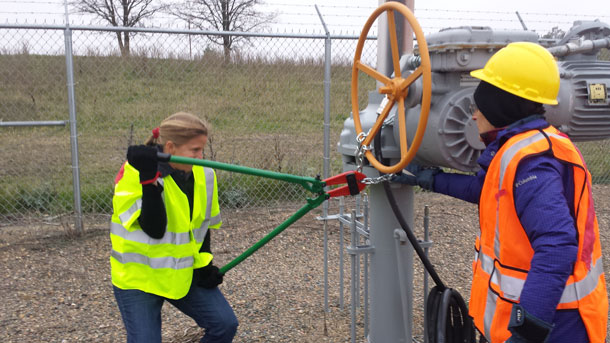
Emily Johnston uses bolt cutters to cut the chain on an emergency shut-off valve on Enbridge Line 4. (Photo: Climate Direct Action - www.shutitdown.today)
Annette Klapstein and Emily Johnston knew they could face felony charges when they temporarily shut down two Enbridge tar sands oil pipelines in October of 2016. But these two ‘valve turners’ say they were compelled to engage in civil disobedience by the dire circumstances of our warming planet. In a conversation with Host Steve Curwood, they discuss their mixed feelings upon being acquitted of felony charges for damaging the pipelines without having the chance to present a climate necessity defense.
Transcript
CURWOOD: It’s Living on Earth. I’m Steve Curwood.
On October 11th 2016, climate activists Emily Johnston and Annette Klapstein took bolt cutters to chains on 2 Enbridge pipelines in northern Minnesota.
[SFX: CHAIN CLINKING, SOUND OF CHAIN BEING CUT]
CURWOOD: Then they turned emergency shut-off valves for Lines 4 and 67.
WOMAN: line 67 is shut down!
CURWOOD: The two women and three other so-called “Valve Turners” temporarily stopped the flow of most of the oil coming from Canada’s tar sands that day. A protester who acted in North Dakota spent months in prison and the pair who acted in Minnesota also faced felony charges. Ms. Johnston, an editor and poet, and Ms. Klapstein, a retired attorney were charged with damaging the Enbridge pipelines and prepared to mount a “climate necessity defense.” But on October 9th, in the middle of their trial, a Minnesota judge abruptly acquitted them of all charges, and they join me now from Seattle, Washington. Welcome to Living on Earth!
KLAPSTEIN: Thank you.
EMILY: Thank you very much, Steve.
CURWOOD: How does it feel to have these felony charges thrown out? Annette?
KLAPSTEIN: I think we all have mixed feelings about that. I've been feeling giddy with happiness that we are not going to jail, and quite frankly that I'm off bail and may have the opportunity to do civil disobedience again because I had to be very careful while out on bail because if I got arrested it could be revoked and I could spend all of my time in the Clearwater County Jail awaiting trial. But we're disappointed that we did not get to put on the climate necessity defense that we wanted to with the very well respected experts that we had lined up to testify for us, like Dr. James Hansen, former climate scientist from NASA, and Bill McKibben. So, it's a mixed bag.
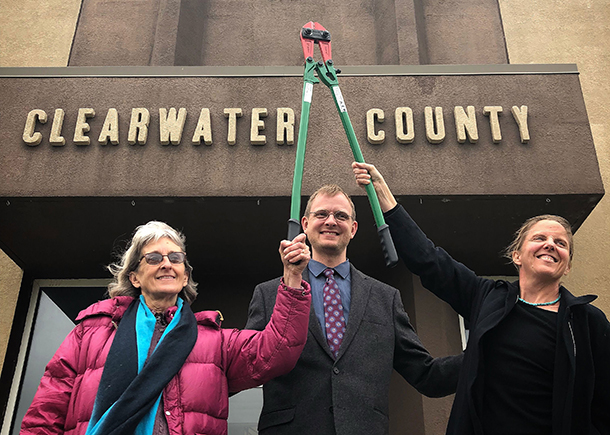
From left: Annette Klapstein, Ben Joldersma and Emily Johnston celebrate their acquittal, and the return of their bolt cutters, outside the Clearwater County Courthouse in Bagley, Minnesota on October 9th, 2018. (Photo: Climate Direct Action - www.shutitdown.today)
CURWOOD: Emily?
JOHNSTON: Yeah, I'll go being stronger about it than that and say that I was really heartbroken, not so much by the acquittal, of course, which is a good thing. It was the sort of second best scenario we could have had, but by the denial of our expert witness testimony on climate change and on civil disobedience. It would have been the dream trial. It could have made a really big difference. So, the thought that this kind of trial might happen in that courtroom in front of those jurors and that might set a precedent that would really have an impact nationally on the climate change debate seemed like a really important thing to me. And of course, until four days before trial began it looked very much like it was going to happen. So, it's a real shame that that it did not.
CURWOOD: Now, as I understand it you had asked the judge to let you use the necessity defense.
JOHNSTON: Yes, and he had granted that to us back in October of 2017, and in fact, he had copies of our expert witness list for about the last year and a half. So, any point in that time period he could have constrained us, constrained the number of witnesses, said you can't talk about this or that, and he chose not to. So, the fact that he did that four days before trial again was stunning. The lawyers couldn't have been more surprised. We couldn't have been more surprised. Until that moment he had been very very reasonable and it seemed like all systems were go. And to be clear, the thing about that that was so striking apart from its suddenness, was the fact that normally speaking, defendants do not have any burden of proof. It's the prosecution that has a burden of proof normally. But, because we are going to use a necessity defense and say that what we did was essentially necessary under the circumstances that we find ourselves in to prevent the greater harm of climate change, we did have the burden of proof, and all of a sudden he did knock out our ability to defend ourselves essentially because who was going to listen to a poet, a retired lawyer, and a software engineer from Seattle on climate change? We're not scientists. We have no authority. So, no matter how articulate we had been it wouldn't have had anything like the same impact as the former head of the NASA Goddard Space Center talking about climate change and how urgent it is, or about Minnesota scientists talking about how urgent it is and how much is already changing in Minnesota. So, again, we had no ability defend ourselves without experts to testify to those things.
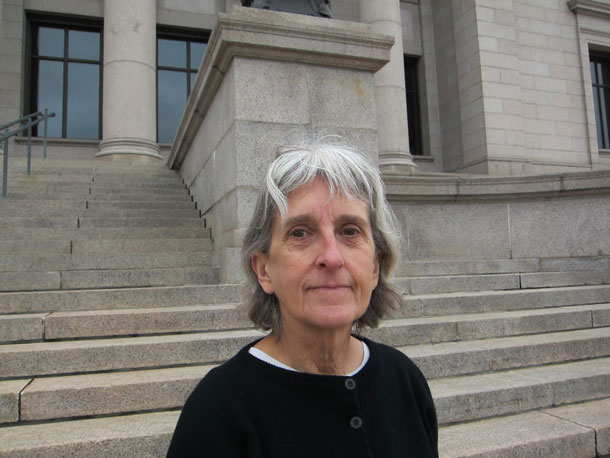
Annette Klapstein, a member of the Seattle Raging Grannies, says now she’s off bail she’s looking forward to once again engaging in climate civil disobedience. (Photo: Climate Direct Action - www.shutitdown.today)
CURWOOD: And the software engineer, your co-defendant was...?
KLAPSTEIN: That was Ben Joldersma, a young father of three who was our support person. Our support people were all arrested. They went in knowing that that was a possibility, but it was certainly our hope when we were planning the action that they would not be arrested.
JOHNSTON: So, we're very very happy that he's acquitted and home with his young family. We're happy that he's acquitted, but I personally am very sorry he didn't get to testify. In the necessity defense hearing in August a year ago, when he testified there was not a dry eye in the room.
KLAPSTEIN: He talked about his young children and what they were facing.
CURWOOD: And then the case becomes even more confusing. I guess because the judge says, on the one hand, you can't have witnesses to make your case, and then he proceeds to go ahead to acquit you of the charges.
KLAPSTEIN: Right. That was after the prosecutor had presented his case which was only two witnesses, the sheriff who arrested us and local Enbridge employee. And all he proved was that we had broken some chains that were holding the lock into the enclosure where the emergency shut off valve was. And we never disputed that. So, we were charged under a statute which was one of the sort of enhanced penalties statutes that are being shoved through state legislatures right now by the fossil fuel industry to give them further penalties against protesters, and the statute we were charged under was specifically damage to pipelines. And the judge ruled and he was correct that the prosecutor had not proved that we had damaged the pipeline in any way.
JOHNSTON: Yeah, and essentially he was ruling that there wasn't evidence for a reasonable jury to convict us, basically. But that was because of course we hadn't damaged the pipeline.
CURWOOD: I'm going to ask you to speculate a bit, both of you Annette and Emily, about Judge Robert Tiffany, and the decisions that he made in your case. How do you think the judiciary might have been influenced by outside forces - politics, sentiment, the fossil fuel industry?
JOHNSTON: This is Emily. In terms of what kind of pressures he may have been under, or what he may have been thinking, or whether his mind might have changed about what kind of precedent he wanted to set and so forth, it's impossible to know and it's distressing and it's certainly something we've been wondering about. He seems like a very reasonable guy. He gave us the necessity defense. He wanted to hear what we had to say and he wanted to let the jury hear it. So, the about face was quite extreme.
KLAPSTEIN: We know for sure that Enbridge provides something like two thirds of the budget of that county, so they obviously have some influence direct or indirect, we don't know. I mean, we have no way to know what may or may not have happened behind the scenes, but they fossil fuel companies have terrible amounts of influence and power in this country, and that's why we have to fight them in the ways that we have to fight them because they do own and control our political system on all levels.
CURWOOD: To what extent did you understand when you did this direct action that law enforcement could bring felony charges against you? Annette?
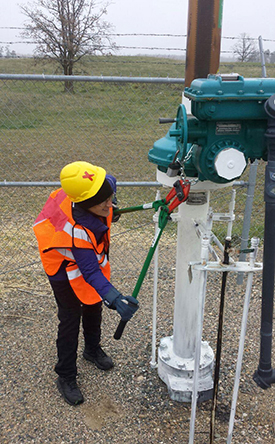
Annette Klapstein cuts the chain on Enbridge Line 67. (Photo: Climate Direct Action - www.shutitdown.today)
KLAPSTEIN: We absolutely knew that that was not only a possibility but a strong probability, and we accepted that risk. I personally feel I'm 66 years old and I feel that it is my job as an elder and it is my job because I am an old white woman who has the privilege of not having the cops show up and shoot me on sight if I do something like that, that it really is my job to step up and do these kinds of things. I know from my young activist of color friends that it's far more risky for them. It's far more risky just with the police showing up that they can be in danger of their lives, and we know that the criminal justice system is far more likely to treat them harshly. We can look right now at what is going on with the prosecutions of indigenous folks who stood up at Standing Rock and often were arrested for no more than standing in prayer and yet are getting felony convictions right now and getting very harsh sentences. So, I have been saying this for the past two years as I go around the country, I implore older white folks to show up and stand up and do these kinds of actions. This is for your grandchildren. It's for all future generations and you're in a good position to be able to do that and have lesser consequences.
CURWOOD: Now, some would say why go to the trouble of shutting off a pipeline and risking all the prison time when obviously that will only stop the flow of oil for a few hours at most?
JOHNSTON: Civil disobedience doesn't work immediately like that. It's not like you turn off the pipeline and you really expect they're going to keep it off forever and ever because you are so brave. [LAUGHS]
But the thing is, when people step up and do something like that and take that kind of risk, it makes other people, for one thing, listen to us in a different way. If we're just held in protests and just writing letters and making phone calls, it's pretty easy to for folks to shut down and not pay attention. But when you've been willing to take a lot of legal risk onto yourself, they do tend to stop and say, hey, why would you do such a crazy thing, and that gives you a chance to tell them why you would do such a crazy thing. So, that's part of it and then the other part of it also, honestly, is like when you do something like that - and there were five of us - and we managed to shut off the equivalent of 15 percent of the US daily oil used that day with nothing more than a pair of bolt cutters and some research. When you do something like that you make it clear to people that those companies need our implicit consent in order to operate. They have millions of miles of pipeline. They have oil trains coming through all of our communities. If we know that if we let them continue on with business as usual, they are destroying the world as we know it quite literally. If we can step up and stop that, whether it's chaining ourselves in governors' offices, whether it is swarming onto sites where they're trying to build new infrastructure like we saw at Standing Rock, whether it's shutting off pipelines or blockading oil trains, there are numerous ways that people can stand up and make a real difference and make it clear that we are not going to go down without a fight.
CURWOOD: Emily and Annette, when one thinks civil disobedience in this country, one thinks Henry David Thoreau, Martin Luther King Jr. To what extent do you feel connected to those efforts of the past?
KLAPSTEIN: Very much so. I mean when you have unjust laws or unjust policies, you sometimes have to break laws in order to call the attention you need to get things changed. There's often this idea that it's a bad thing to break the law, but I can say as a former lawyer that just because something is legal does not mean it was moral. There have been many many laws in the past that have been totally immoral, slavery being a good example.
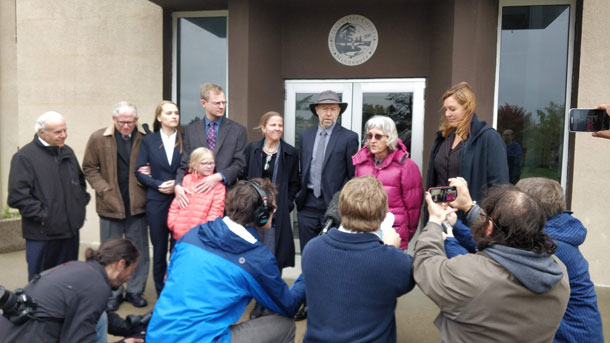
Emily Johnston, Annette Klapstein and Ben Joldersma, surrounded by supporters, lawyers and the media outside the Clearwater County Courthouse on the day of their acquittal, October 9th, 2018. (Photo: Climate Direct Action - www.shutitdown.today)
JOHNSTON: This is Emily. I was going to say also, I mean I read on civil disobedience when I was a kid and certainly read about Martin Luther King and Gandhi and figures like that, and I do feel that that's an incredibly important example and tradition. The other thing I think about with regard to climate change, more recently I've been thinking a little bit about people like Raoul Wallenberg, the Swedish diplomat who saved many thousands of Jews during World War II. And in a way, the climate change fight has a lot in common with that because so many people get overwhelmed and think well there's catastrophe coming, I can't do anything about it. But you just get up every day and you do the best you can, and you save what you can save. And there's still quite a lot that we can save, and so can we save life as we know it, probably not. Can we save everybody? Oh, definitely not. We already have failed to do that. But we can get up every day and we can save a tremendous amount, and we have a lot of power that way and its power we need to utilize.
CURWOOD: I was going to ask you, Annette. Obviously you're concerned enough about climate to risk spending time in prison. What keeps you from total despair?
KLAPSTEIN: There are days when it is total despair, but I feel I have no option but to continue to fight for what there is still to fight for, and as Emily says, it's not absolute. Anything we can save is worth saving, and I often say what are my alternatives? Am I just going to sit home and watch TV and wait for the world to end? I absolutely am not, so at worst I can go down fighting with the best people I know and that is worth doing. I remember that Alice Walker said resistance is the secret of joy and I have found that to be absolutely true. When you exercise your power and do everything that you can to stop a great evil, it is a joyful thing.
CURWOOD: Emily Johnston is a poet and Annette Klapstein is a retired attorney, and they are two of the five valve turners. Thank you so much for taking the time with us today.
JOHNSTON: Thank you, Steve.
KLAPSTEIN: Thanks for having us.
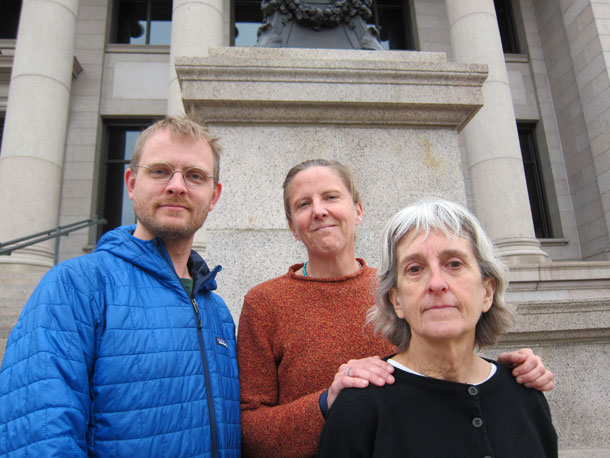
Ben Joldersma, Emily Johnston and Annette Klapstein outside the Minnesota State Supreme Court in Minneapolis. (Photo: Climate Direct Action - www.shutitdown.today)
CURWOOD: The valve turners chose to get arrested to make the case that climate change is more of a crime than acts of civil disobedience against it. And without getting arrested 21 young people are challenging in court the government’s role in global warming emissions. Their lawsuit, known as Juliana Vs. United States, was set to go on trial in Oregon on October 29, but on October 19th Supreme Court Chief Justice John Roberts abruptly halted the case at the request of the Trump Administration. As we prepared this broadcast it was unclear if this is merely a delay or if the high court will move to dismiss the case altogether before evidence is taken.
Statement from Tracie Kenyon of Enbridge
“Enbridge maintains that the actions taken by individuals in 2016 to trespass on our facility and attempt to tamper with energy infrastructure were reckless and dangerous. The individuals involved in these activities claimed to be protecting the environment, but they did the opposite and put the environment and the safety of people at risk -- including themselves, first responders and neighboring communities and landowners.
“Our preference is always to seek to resolve differences of opinion through dialogue – peacefully and respectfully. We don’t tolerate trespassing, vandalism, or mischief, and Enbridge will seek to prosecute those involved to the fullest extent of the law.”
Links
The Valve Turners’ website, “Shut It Down: Climate Direct Action”
The Guardian | “Charges dropped against climate activists who tried to shut down pipelines”
Watch: the Valve Turners short film
The New York Times Magazine | “‘I’m Just More Afraid of Climate Change Than I Am of Prison’”
Living on Earth wants to hear from you!
Living on Earth
62 Calef Highway, Suite 212
Lee, NH 03861
Telephone: 617-287-4121
E-mail: comments@loe.org
Newsletter [Click here]
Donate to Living on Earth!
Living on Earth is an independent media program and relies entirely on contributions from listeners and institutions supporting public service. Please donate now to preserve an independent environmental voice.
NewsletterLiving on Earth offers a weekly delivery of the show's rundown to your mailbox. Sign up for our newsletter today!
 Sailors For The Sea: Be the change you want to sea.
Sailors For The Sea: Be the change you want to sea.
 The Grantham Foundation for the Protection of the Environment: Committed to protecting and improving the health of the global environment.
The Grantham Foundation for the Protection of the Environment: Committed to protecting and improving the health of the global environment.
 Contribute to Living on Earth and receive, as our gift to you, an archival print of one of Mark Seth Lender's extraordinary wildlife photographs. Follow the link to see Mark's current collection of photographs.
Contribute to Living on Earth and receive, as our gift to you, an archival print of one of Mark Seth Lender's extraordinary wildlife photographs. Follow the link to see Mark's current collection of photographs.
 Buy a signed copy of Mark Seth Lender's book Smeagull the Seagull & support Living on Earth
Buy a signed copy of Mark Seth Lender's book Smeagull the Seagull & support Living on Earth

